FCC Map Update, FCC Renews FirstNet Spectrum Authority, NTIA Warns EU Over Big Tech Proposal
New FCC map shows 8.3 million unserved locations.

May 30, 2023 – The latest update to the Federal Communications Commission’s broadband availability map shows 8.3 million unserved locations, an increase of 330,000 over the previous map that came out in November, according to a statement by the commission Tuesday.
According to the FCC’s statement, the new version has resolved 75 percent of the issues raised since November and reflects more than a million new serviced locations.
“These incremental updates reflect both challenge outcomes and any corrections providers make to their filings,” continued the statement. “We will continue to accept challenges every day, every week and every month, and those challenges will continue to improve the map.”
This is the second version of the map since November’s preliminary version. The commission has said it is putting “significant resources” in its improvement, as the map will be relied upon by the National Telecommunications and Information Administration to allocate to the states by June 30 the $42.5 billion from its Broadband Equity, Access and Deployment program.
The commission’s underlying map data, called the fabric, has been met with challenges from local entities, which have shown an overestimation of the number of serviceable locations. The FCC makes changes to the data accordingly.
FCC renews FirstNet spectrum authority in 700 MHz band
The Federal Communications Commission renewed FirstNet Authority’s license to operate in the 700 MHz public safety band Friday.
“In sum, based on the totality of the record, we conclude that FirstNet has sufficiently demonstrated compliance with the requirements of the Spectrum Act to warrant renewal of its license,” read an FCC statement.
The spectrum authorization grants FirstNet use until at least 2027.
FirstNet submitted this application for renewal in August 2022, its first as a body.
Twelve parties submitted varied opinions regarding the unconditional renewal of its license. The Verizon First Responder Advisory Council and T-Mobile, among others, advocated for a more rigorous examination of the operation of FirstNet. Concerns mainly revolved around FirstNet’s contractual relationship with AT&T, its extension of the band deployment to non-public safety entities, and cybersecurity reasons.
In 2012, Congress enacted the Spectrum Act to establish FirstNet as a separate entity within the National Telecommunications and Information Administration responsible for managing “a nationwide, interoperable public safety broadband network” in the 700Mhz spectrum. FirstNet then secured a 25-year deal with AT&T valued at $100 billion to construct a nationwide network for first responders.
NTIA warns against Big Tech directly paying ISPs
The NTIA submitted comments Thursday opposing a European Union proposal to force Big Tech to pay internet service providers to build out infrastructure.
The comments pointed to “substantial risks” involved with mandating payments directly from Big Tech to telecom operators.
“Enforcing mandatory payments on a subset of traffic generators could be discriminatory and degrade equal access to the Internet, thereby endangering the principle of Internet openness/net neutrality,” read the submission.
The response also highlighted unnecessary costs and bottlenecks that would trickle down to the end-users, referencing similar findings by the The Body of European Regulators for Electronic Communications and in South Korea.
The comments come as heated debates take hold in the United States about whether or not large technology corporations should contribute to the Universal Service Fund, which subsidizes telecommunications services upon which the companies rely. The FCC has recommended that Congress establish a more robust framework for addressing new contributions, but Congress has yet to make a decision on the matter.
Early this March, senators from Mississippi, New Mexico, Indiana, and Arizona introduced new legislation pushing Congress and the FCC to actively consider potential contributions from Big Tech revenue.
“The FAIR Contributions Act would help Congress assess the feasibility of making Big Tech companies contribute to the USF,” said Sen. Roger Wicker, R-Mississippi. “It is important to ensure the costs of expanding broadband are distributed equitably and that all companies are held accountable for their role in shaping our digital future.”
Earlier this month, the Senate set up a working group to study the USF program.










